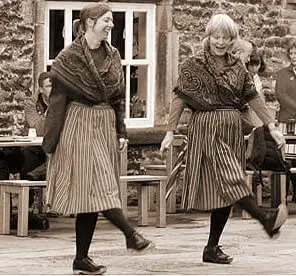To clog up is to become obstructed.
For example:
‘The leaves clogged up the drain’
.
‘The heavy traffic made the roads clog up’.
To clog up is to become obstructed.
For example:
‘The leaves clogged up the drain’
.
‘The heavy traffic made the roads clog up’.
People often send me suggestions of the origins of phrases to add here. These range from the interesting and erudite to the frankly bonkers. A recent proposition was ‘clog up the works’, which was said could have derived from Luddite Dutch workers throwing their clogs into machinery to wreck it. That sounded like classic folk-etymology but I decided to look closer when I read that the French for clog is ‘sabot’ and that was how ‘saboteur’ derived. That was certainly at the interesting end of the scale and worth investigating.
The above story circulates in various forms; the workers are either Dutch or French and the sabotage is said to have taken place in either the 16th or the 17th century. As it turns out, ‘sabotage’ is a 20th century invention. The earliest known example of the word in print is in a Reuters’ report of a labour dispute in Paris in June, 1907, published in the UK in the Manchester Courier:
M[onsieur] Bousquet solemnly declared on oath that he had never recommended sabotage or pillage.
The French word ‘saboteur’ is a verb meaning ‘make a noise with sabots’ and was generally applied to anyone who clattered around like a bull in a china shop and generally fouled things up. The original saboteurs were French dissidents, but they wore clogs rather than threw them. The ‘damaging machinery with footwear’ source of the idiom ‘clog up’ gets a close but no cigar award.
So, how did ‘clog up’ originate?
To 14th century English peasants a clog was a heavy block of wood. Oxen were ‘clogged up’ by fixing the blocks to their feet to stop them straying. When shoemakers first hollowed out blocks of wood to make footwear, ‘clog’ was the obvious name to go for. John Trevisa’s translation of de Glanville’s Latin text De Proprietatibus Rerum, 1398, includes:
He feedeth and nourisheth oxen and bindeth their feet … and cloggeth them while they be in pasture and leas.
That form of clogging developed into our current use of the verb ‘to clog’ via several words of similar sound and meaning. In the early 16th century ‘clogged up’ meant to be stuck in sticky clay, literally ‘clayed up’. This was a muddling of ‘clog’, ‘clay’ and ‘clag’. In this part of the world, that is Yorkshire, and I believe in other parts too, sticky clay soil is called ‘claggy’.
Later in the 16th century, ‘clog up’ was used as we now use it, as a general term for ‘impede/choke up’. This came about by means of other muddlings, of ‘clogging’, ‘clotting’ and ‘cloying’. We might have opted for any of ‘clay up’, ‘clag up’, ‘clot up’ or ‘cloy up’ but ‘clog up’ got the nod.
Going back to the oxen, it’s clear that a ‘clog’ and a ‘log’ was the same thing, so the beasts might just as well have been said to be ‘logged up’. The change of language didn’t happen in the fields but it did inside the house. At Christmas we now burn (or more often these days, eat) yule logs. When the first reveller decided to give a name to the large block of wood burned at Christmas, it was a clog not a log. Henry Bourne recorded this in The Antiquities of the Common People, 1725:
Our Fore-Fathers were wont to lay a Log of Wood upon the Fire, which they termed a Yule-Clog, or Christmas-Block.
Hereabouts we have ‘clog dancing’. That might easily have turned into ‘log dancing’, which sounds much more fun.
Trend of clog up in printed material over time

A B C D E F G H I J K L M N O P Q R S T UV W XYZ
American Animals Australian Bible Body Colour Conflict Death Devil Dogs Emotions Euphemism Family Fashion Food French Horses ‘Jack’ Luck Money Military Music Names Nature Nautical Numbers Politics Religion Shakespeare Stupidity Entertainment Weather Women Work
Have you spotted something that needs updated on this page? We review all feedback we receive to ensure that we provide the most accurate and up to date information on phrases.